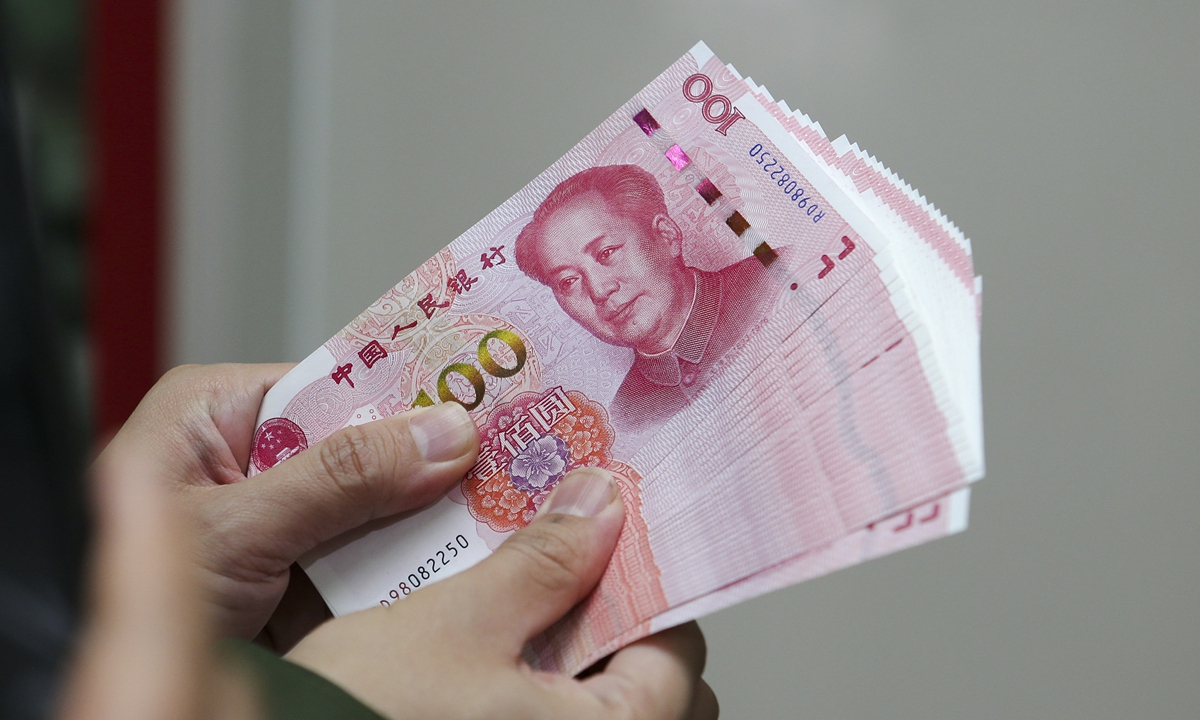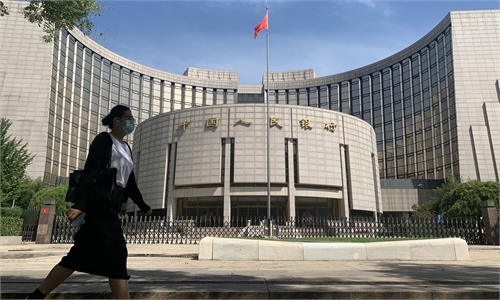
RMB Photo:VCG
The People's Bank of China, the central bank, on Monday cut the one-year loan prime rate (LPR), a market-based benchmark lending rate, by 10 basis points (bps) to 3.45 percent, while leaving the five-year LPR at 4.2 percent. The move was the latest effort to bolster steady growth amid challenges, following a tone-setting meeting in July.
Chinese experts said the country's economic post-COVID-19 recovery has shown a wave-like development and it's been a tortuous process. However, China's sound economic fundamentals remain unchanged, and recently announced support policies will further boost a second-half rebound, with GDP growth anticipated to be around 6 percent, experts noted.
The one-year LPR cut was the second this year, following a 10 bps cut in June. It was also within expectations since the central bank has stepped up policies to stimulate financing demand in the real economy, boost investment and employment and strengthen the recovery momentum driven by domestic demand, Zhou Maohua, an economist at Everbright Bank told the Global Times on Monday.
Zhou said that the five-year LPR has been kept steady partly due to factors such as a further narrowing in some commercial banks' net interest margins and the fact that some cities' housing mortgage rates are lower than the five-year LPR.
"Holding the five-year LPR steady will help prevent potential adverse effects resulting from a wider interest rate gap between new and existing mortgage loans," he said.
Last week, the PBC cut the medium-term lending facility (MLF) by 15 bps to 2.5 percent in a bid to adjust market liquidity.
Following a meeting of the Political Bureau of the Communist Party of China Central Committee on July 24, China has rolled out targeted and substantive measures aimed at sparking consumption, strengthening the private sector and attracting foreign investment, which have been applauded by domestic and foreign investors.
On Friday, the central bank, the National Financial Regulatory Administration and the China Securities Regulatory Commission vowed in a video meeting to make financial support for the real economy more sustainable, and ensure that the financial sector plays a positive role in boosting consumption, stabilizing investment and expanding domestic demand.
To boost Chinese stocks market, the CSRC on Friday announced a raft of support policies, including cutting transaction fees, developing equity funds and considering the creation of a "green channel" for technology companies that aim for breakthroughs in core technologies.
On Monday, more than a dozen leading Chinese public fund firms, securities firms and asset management firms expressed confidence in the long-term development of China's capital market, saying they would increase holdings of their own financial products.
"As macroeconomic policies are producing effects, multiple aspects of the economy have shown an improvement recently. China's sound economic fundamentals remain unchanged and the economy continues on the recovery track," Cao Heping, an economist at Peking University, told the Global Times on Monday.
Consumption in sectors, including transport, tourism and catering, have shown relatively strong performances in the past months, indicating that consumer confidence hasn't been hurt as seriously as many thought, he said.
"Positive factors ranging from stable policies and consumer confidence to the country's burgeoning digital economy will support the Chinese economy to grow by around 6 percent in the second half of the year," Cao said.
Chinese regulators still have enough tools on hand and may even come up with new ones so that precise financial support can be provided to the real economy. With the LPR being lowered this month, authorities may announce a cut in the reserve requirement ratio for financial institutions, Zhou said.
Instead of a general relaxation of monetary policy, it's more important to come up with targeted measures for key groups, for example, favorable policies supporting first-home buyers and giving money to low-income groups, Chen Fengying, an economist and former director of the Institute of World Economic Studies at the China Institutes of Contemporary International Relations, told the Global Times on Monday.

